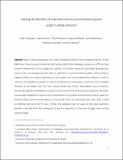Files in this item
Valuing the benefits of improved marine environmental quality under multiple stressors
Item metadata
| dc.contributor.author | Tuhkanen, Heidi | |
| dc.contributor.author | Piirsalu, Evelin | |
| dc.contributor.author | Nõmmann, Tea | |
| dc.contributor.author | Karlõševa, Aljona | |
| dc.contributor.author | Nõmmann, Sulev | |
| dc.contributor.author | Czajkowski, Mikolaj | |
| dc.contributor.author | Hanley, Nicholas David | |
| dc.date.accessioned | 2017-02-14T00:32:32Z | |
| dc.date.available | 2017-02-14T00:32:32Z | |
| dc.date.issued | 2016-05-01 | |
| dc.identifier | 240750271 | |
| dc.identifier | 427e629e-158c-43a9-9fab-84d191b6df94 | |
| dc.identifier | 84957871839 | |
| dc.identifier | 000372589800039 | |
| dc.identifier.citation | Tuhkanen , H , Piirsalu , E , Nõmmann , T , Karlõševa , A , Nõmmann , S , Czajkowski , M & Hanley , N D 2016 , ' Valuing the benefits of improved marine environmental quality under multiple stressors ' , Science of the Total Environment , vol. 551-552 , pp. 367-375 . https://doi.org/10.1016/j.scitotenv.2016.02.011 | en |
| dc.identifier.issn | 0048-9697 | |
| dc.identifier.uri | https://hdl.handle.net/10023/10284 | |
| dc.description | This study was carried out as a part of the GES-REG project (Good Environmental Status through REGional coordination and capacity building), funded by Central Baltic INTERREG IV A Programme 2007–2013, co-funded by the Environmental Investment Centre of Estonia. MC gratefully acknowledges the support of the Polish Ministry of Science and Higher Education and the Foundation for Polish Science. NH thanks MASTS (www.masts.ac.uk) for funding part of his work. | en |
| dc.description.abstract | Many marine ecosystems are under increasing pressure from multiple stressors. In the Baltic Sea, these stressors include oil and chemical spills from shipping, nutrient run-off from land and the introduction of non-indigenous species. All of these pressures have been growing over recent years. Increasing pressures lead to reductions in environmental quality, which produce negative effects on human well-being. In this paper, the choice experiment method is used to estimate the benefits to people in Estonia resulting from reductions in pressure from multiple stressors in the Baltic Sea. The main results show that, firstly, respondents have a positive, statistically-significant willingness to pay to reduce each of the three stressors analysed. Secondly, the average willingness to pay for the improvement in the quality of all Estonian marine waters to achieve Good Environmental Status is around 65 euro per household per year, with a 95% confidence interval of 48-77 euro. Thirdly, the greatest share of value of this total economic benefit is derived from the willingness to pay for reductions in the risk of large scale oil and chemical spills. | |
| dc.format.extent | 929050 | |
| dc.language.iso | eng | |
| dc.relation.ispartof | Science of the Total Environment | en |
| dc.subject | Multiple stressors | en |
| dc.subject | Good Environmental Status | en |
| dc.subject | Marine Strategy Framework Directive | en |
| dc.subject | Marine water quality | en |
| dc.subject | Choice experiments | en |
| dc.subject | Oil and chemical spills | en |
| dc.subject | Eutrophication | en |
| dc.subject | Non-indigenous species | en |
| dc.subject | GE Environmental Sciences | en |
| dc.subject | NDAS | en |
| dc.subject | SDG 14 - Life Below Water | en |
| dc.subject | SDG 15 - Life on Land | en |
| dc.subject.lcc | GE | en |
| dc.title | Valuing the benefits of improved marine environmental quality under multiple stressors | en |
| dc.type | Journal article | en |
| dc.contributor.institution | University of St Andrews. Geography & Sustainable Development | en |
| dc.identifier.doi | 10.1016/j.scitotenv.2016.02.011 | |
| dc.description.status | Peer reviewed | en |
| dc.date.embargoedUntil | 2017-02-13 |
This item appears in the following Collection(s)
Items in the St Andrews Research Repository are protected by copyright, with all rights reserved, unless otherwise indicated.

